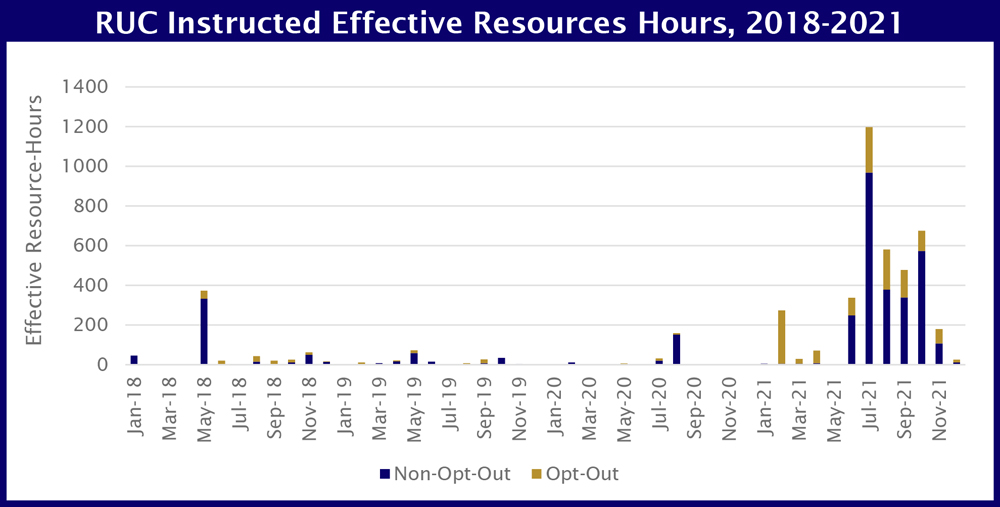Stakeholders Delay Decision on Changes to RUC Usage
AUSTIN, Texas — ERCOT’s Technical Advisory Committee last week agreed to table discussion on a proposal to reduce the offer floor for reliability unit commitments (RUC) and remove opt-out provisions, holding its comments on the process until a March 10 workshop.
Despite pressure from the Texas Public Utility Commission to move quickly on market changes, commission staff said during Wednesday’s meeting that they were amenable to tabling the proposed revision request (NPRR1092) given the substantive comments the proposal has generated.
“The use of RUC has changed over the last year. If we take a month to table, we might be able to come up with some middle ground,” said Eric Goff, representing residential consumers.
Stakeholders have complained about ERCOT’s use of RUCs since last summer as part of the grid’s conservative operations management. They have said deploying more reserves to build up a healthy reserve margin only increases the wear and tear on generators not designed for frequent operations and hastens their retirements.
The subject quickly came up last week during a panel discussion on thermal generation as part of Infocast’s ERCOT Market Summit.
“We used to use RUCs for reliability. Now, it’s become commonplace way for ERCOT to provide an extra cushion of reserve margin,” said Michele Richmond, executive director for the Texas Competitive Power Advocates trade association. “It’s a problem we hope to see that rectified … so [gas units] come online in a manner they were supposed to run.”
“The use of RUC is really a symptom,” Calpine’s Brandon Whittle said. “It’s a symptom of a broken market design.”

In a study contracted by Vistra, Texas’ largest generation owner, London Economics said that 96% of RUC commitments last year were instructed to maintain additional online reserves and not for resolving local issues. The consulting firm said that were the RUC offer floor to be lowered from $1,500/MWh to $75/MWh, as NPRR1092 would mandate, RUC capacity offers would be dropped down in the dispatch stack.
London Economics said that since June, system prices have only exceeded the $75/MWh threshold for more than 200 hours, or about 5% of the time. With the change in position, it said, more “out of market” RUC capacity would be dispatched, displacing other economic offers and leading to a lower clearing price.
It also said that were the lower RUC offer floor to increase the amount of energy produced by RUC resources, the real-time deployment price adder and the operating reserve demand curve (ORDC) would both be negatively affected.
Shell Energy’s Resmi Surendran filed extensive comments opposing NPRR1092, asking her fellow stakeholders to “carefully consider” the proposed changes’ unintended consequences.
“It is important to determine the need for the proposed changes in light of the impacts of, and expected market participant behavior changes that will result from, the market design changes that have already been directed by” the PUC, Surendran wrote.
She said Shell’s comments will show why reducing the RUC offer floor would have been a possible solution if ORDC changes were not possible; why the reduction is not needed to address Independent Market Monitor-identified incentive problem; and a possible alternative if $1,500/MWh is considered a high offer floor for RUC resources.
Members Approve Firm Fuel Measures
Committee members endorsed a pair of measures that would create a firm fuel product, as directed last year by Texas lawmakers and regulators. (See “Staff Rushes Firm-fuel Product,” ERCOT Technical Advisory Committee Briefs: Jan. 31, 2022.)
NPRR1120 would create a firm fuel supply service (FFSS) designed to provide additional grid reliability and resilience during extreme cold weather and to compensate generators that meet a higher resilience standard in the face of a natural gas curtailment or other fuel supply disruption. The PUC ordered that the standalone, auction-based product be procured similarly to ERCOT’s black start program and serve as a stopgap should weatherization not be incorporated into a load-serving entity’s obligation.
The change has a narrow scope so necessary changes can be made to ERCOT’s settlement and billing system first in meeting the 2022-2023 winter deadline. The grid operator said in a filing with the PUC that if it meets the deadline, it would be the first ISO or RTO with a firm fuel product.
Staff said stakeholder concerns regarding qualifying technologies, pricing methods and desired FFSS quantities will be addressed as part of a larger discussion with the PUC and during the development of an FFSS request for proposals that will be issued later this year.
Resources providing FFSS would need to meet technical requirements specified in the proposal and also be prepared to deliver during fuel supply disruptions. A qualified scheduling entity representing an FFSS resource would, when deployed by ERCOT, have to restore its firm fuel service capability within the RFP’s restocking period.
Demand Control 2’s Chris Hendrix, representing the retail segment, cast the lone dissenting vote. “This is moving us to a capacity market,” he said.
Hendrix also opposed the accompanying other binding document change (OBDRR039) that would remove FFSS-deployed resources’ high sustained limits from the ORDC’s reserve calculation. He was joined by South Texas Electric Cooperative (STEC) and Golden Spread Electric Cooperative.
STEC’s Clif Lange said “it seems kind of odd” that the measure’s language would pull assets that already have firm-fuel capability from the ORDC’s reserves calculation.
“I think the assumption is that those assets would have been able to operate on their alternate fuel, but for the FFSS payments, and I don’t know that that’s a correct assumption,” he said. “It’s not logical to conclude that FFSS deployments are an out-of-market action.”
IMM Carrie Bivens, who suggested the OBDRR’s ORDC language, said she looked at the issue differently.
“It’s not so much whether or not they would have been there without the service,” she said. “The fact that if there’s a small number of resources that are getting the side payment, then they really have no costs. And you’ve got other resources that are not allowed [side payments] because they are generating and providing a reliability service to the event and they’re not being compensated appropriately on the scarcity pricing.”
The revisions’ quick development and passage drew praise from American Electric Power’s Richard Ross.
“I never would have believed the revision request would have appeared to come through as easily as it did,” he said. “I would have expected a lot more bloodletting.”
In recognition of staff’s ability to incorporate stakeholder feedback into the final proposals, Ross promised ERCOT staff working on NPRR1120 a Richard Ross Gold Star Award. Ross does not take dispensing the award lightly.
“It’s a very sought-after award. It’s something people can put on their performance reviews and comes with a certificate of authenticity,” Ross said, his tongue apparently planted firmly in cheek.
The TAC also approved:
-
- NPRR1097, which would create reports posted three days after each operating day that document forced outages, maintenance outages and forced derates of generation and energy storage resources.
- A Planning Guide revision (PGRR095) that would establish minimum deliverability criteria over the entire real power capability range of each ERCOT resource whose output is primarily within the grid operator’s control through dispatch instructions.
ERCOT to Resume In-person Meetings
The TAC’s next meeting, rescheduled from March 23 to March 30 at ERCOT’s new MET Center facilities, will mark the resumption of in-person stakeholder committees.
The grid operator said Friday that all other in-person stakeholder meetings can resume in April. Voting members will still be able to participate and vote remotely and be counted toward the quorum.
The Board of Directors will hold the first in-person meeting at ERCOT’s new facility March 7 and 8.
Staff said they continue to take into consideration its Travis County COVID-19 guidelines and will issue updates accordingly.




